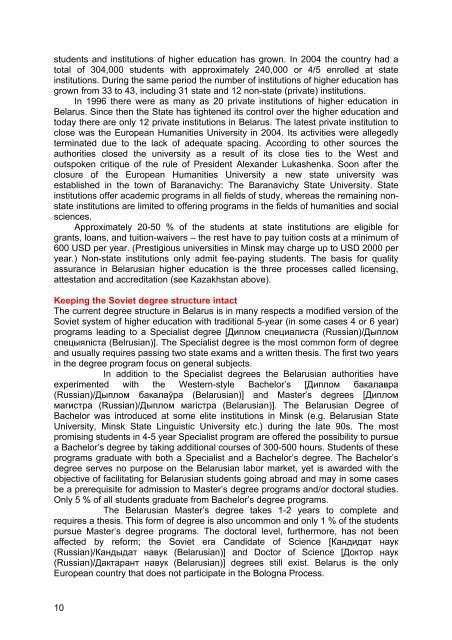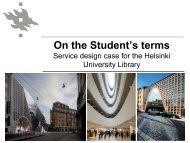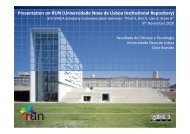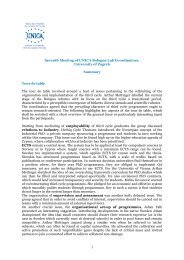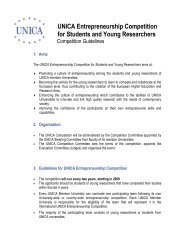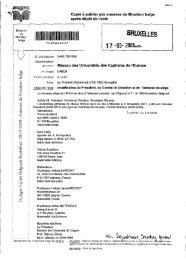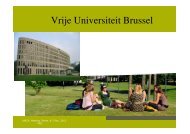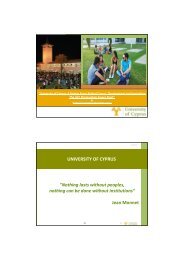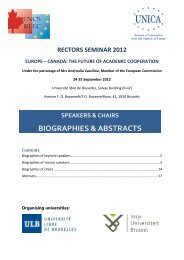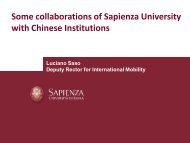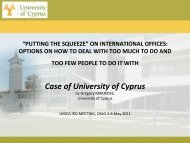Reforming the educational systems of the former Soviet Union - UNICA
Reforming the educational systems of the former Soviet Union - UNICA
Reforming the educational systems of the former Soviet Union - UNICA
You also want an ePaper? Increase the reach of your titles
YUMPU automatically turns print PDFs into web optimized ePapers that Google loves.
students and institutions <strong>of</strong> higher education has grown. In 2004 <strong>the</strong> country had a<br />
total <strong>of</strong> 304,000 students with approximately 240,000 or 4/5 enrolled at state<br />
institutions. During <strong>the</strong> same period <strong>the</strong> number <strong>of</strong> institutions <strong>of</strong> higher education has<br />
grown from 33 to 43, including 31 state and 12 non-state (private) institutions.<br />
In 1996 <strong>the</strong>re were as many as 20 private institutions <strong>of</strong> higher education in<br />
Belarus. Since <strong>the</strong>n <strong>the</strong> State has tightened its control over <strong>the</strong> higher education and<br />
today <strong>the</strong>re are only 12 private institutions in Belarus. The latest private institution to<br />
close was <strong>the</strong> European Humanities University in 2004. Its activities were allegedly<br />
terminated due to <strong>the</strong> lack <strong>of</strong> adequate spacing. According to o<strong>the</strong>r sources <strong>the</strong><br />
authorities closed <strong>the</strong> university as a result <strong>of</strong> its close ties to <strong>the</strong> West and<br />
outspoken critique <strong>of</strong> <strong>the</strong> rule <strong>of</strong> President Alexander Lukashenka. Soon after <strong>the</strong><br />
closure <strong>of</strong> <strong>the</strong> European Humanities University a new state university was<br />
established in <strong>the</strong> town <strong>of</strong> Baranavichy: The Baranavichy State University. State<br />
institutions <strong>of</strong>fer academic programs in all fields <strong>of</strong> study, whereas <strong>the</strong> remaining nonstate<br />
institutions are limited to <strong>of</strong>fering programs in <strong>the</strong> fields <strong>of</strong> humanities and social<br />
sciences.<br />
Approximately 20-50 % <strong>of</strong> <strong>the</strong> students at state institutions are eligible for<br />
grants, loans, and tuition-waivers – <strong>the</strong> rest have to pay tuition costs at a minimum <strong>of</strong><br />
600 USD per year. (Prestigious universities in Minsk may charge up to USD 2000 per<br />
year.) Non-state institutions only admit fee-paying students. The basis for quality<br />
assurance in Belarusian higher education is <strong>the</strong> three processes called licensing,<br />
attestation and accreditation (see Kazakhstan above).<br />
Keeping <strong>the</strong> <strong>Soviet</strong> degree structure intact<br />
The current degree structure in Belarus is in many respects a modified version <strong>of</strong> <strong>the</strong><br />
<strong>Soviet</strong> system <strong>of</strong> higher education with traditional 5-year (in some cases 4 or 6 year)<br />
programs leading to a Specialist degree [Диплом специалиста (Russian)/Дыплом<br />
спецыяліста (Belrusian)]. The Specialist degree is <strong>the</strong> most common form <strong>of</strong> degree<br />
and usually requires passing two state exams and a written <strong>the</strong>sis. The first two years<br />
in <strong>the</strong> degree program focus on general subjects.<br />
In addition to <strong>the</strong> Specialist degrees <strong>the</strong> Belarusian authorities have<br />
experimented with <strong>the</strong> Western-style Bachelor’s [Диплом бакалавра<br />
(Russian)/Дыплом бакалаўра (Belarusian)] and Master’s degrees [Диплом<br />
магистра (Russian)/Дыплом магістра (Belarusian)]. The Belarusian Degree <strong>of</strong><br />
Bachelor was introduced at some elite institutions in Minsk (e.g. Belarusian State<br />
University, Minsk State Linguistic University etc.) during <strong>the</strong> late 90s. The most<br />
promising students in 4-5 year Specialist program are <strong>of</strong>fered <strong>the</strong> possibility to pursue<br />
a Bachelor’s degree by taking additional courses <strong>of</strong> 300-500 hours. Students <strong>of</strong> <strong>the</strong>se<br />
programs graduate with both a Specialist and a Bachelor’s degree. The Bachelor’s<br />
degree serves no purpose on <strong>the</strong> Belarusian labor market, yet is awarded with <strong>the</strong><br />
objective <strong>of</strong> facilitating for Belarusian students going abroad and may in some cases<br />
be a prerequisite for admission to Master’s degree programs and/or doctoral studies.<br />
Only 5 % <strong>of</strong> all students graduate from Bachelor’s degree programs.<br />
The Belarusian Master’s degree takes 1-2 years to complete and<br />
requires a <strong>the</strong>sis. This form <strong>of</strong> degree is also uncommon and only 1 % <strong>of</strong> <strong>the</strong> students<br />
pursue Master’s degree programs. The doctoral level, fur<strong>the</strong>rmore, has not been<br />
affected by reform; <strong>the</strong> <strong>Soviet</strong> era Candidate <strong>of</strong> Science [Кандидат наук<br />
(Russian)/Кандыдат навук (Belarusian)] and Doctor <strong>of</strong> Science [Доктор наук<br />
(Russian)/Дактарант навук (Belarusian)] degrees still exist. Belarus is <strong>the</strong> only<br />
European country that does not participate in <strong>the</strong> Bologna Process.<br />
10


